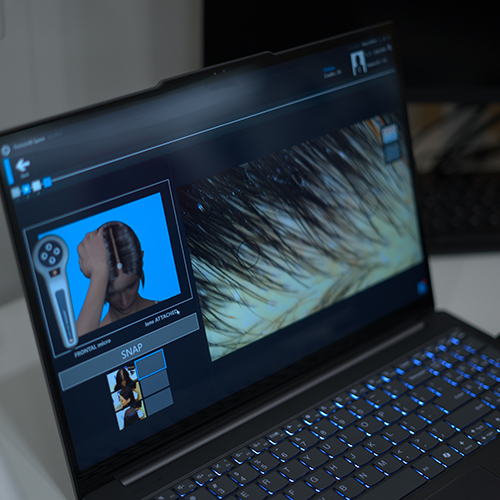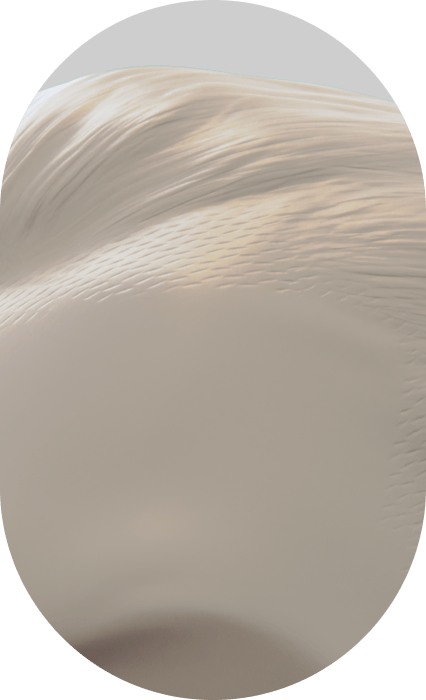Trichotillomania (Hair Pulling) Treatment NYC
Trichotillomania hair loss treatment is something you may need once you’ve kicked the habit of pulling out your hair when you get anxious or stressed. Trich hair loss actually is fairly common, especially among teens grappling with difficult emotions. Instead of ignoring the bald spots and thinning hair of you or your teenager, call the experts in hair loss at Linkov Hair Surgery in Manhattan. You’ll find a most compassionate doctor who has dealt with his own hair loss issues. Trusted by celebrities, this top doc treats everyone with the utmost respect, no matter the condition causing the hair loss.

What Is Trichotillomania?
Trichotillomania, sometimes referred to as trich, is a hair-pulling, impulse control disorder characterized by a recurrent uncontrollable urge to pull the hair from your scalp or other body areas. The condition is more common among teenagers and young adults. It results in noticeable hair loss.
If you suffer from this hair pulling disorder, you experience bouts of tension and anxiety, which only dissipates after pulling hair off your head, eyebrows or eyelashes. A mental disorder, it affects your appearance and ability to function normally. It’s a sign of other underlying mental conditions.
Trich hair loss compounds the underlying emotional problems. It requires early diagnosis and treatment. The best surgeons at New York’s Linkov Hair Surgery, led by Dr. Gary Linkov, diagnose and treat all types of hair loss, including trich hair loss. They offer individualized trichotillomania hair regrowth, as well as other hair loss treatments for men and for women through a multi-disciplinary approach.

Why Do I Need to Treat Trichotillomania Hair Loss?
Premature hair loss is a traumatic experience for adults — and it can be even worse for teenagers. The effects continue into adulthood if not addressed early. Reasons to worry about the hair pulling disorder and seek trichotillomania hair regrowth treatment include:
- Hair loss exacerbates the stress in a teenager.
- Trichophagia, a condition in which people suffering from trichotillomania eat the hair pulled off the body, causes hairball-like blockages in their digestive tract. You may need surgery to remove the blockage.
- Hair loss affects the body image of the young adult
- Hair loss may lead to low self-esteem.
- Complications, such as skin and hair damage, leads to scalp scarring and a high risk of infections.
The compounded effects of anxiety, hair loss, poor body image and low self-esteem may overwhelm a teenager, leading to suicidal thoughts or other self-harm ideas. An early diagnosis protects your child and prevents further self-destructive habits.
What Are the Symptoms of Trichotillomania?
Doctors assess the signs to diagnose the underlying cause of hair loss. Some symptoms you may need to regrow hair trichotillomania treatment include:
- Pulling out hair from the scalp and other areas such as eyebrows, eyelashes, genital area, beard or mustache
- Extreme attempts to hide the hair-pulling condition
- Intense urge to pull hair out, accompanied by growing tension until they do
- Specific rituals that accompany hair pulling, such as rubbing hair pulled off across the lips or face
- A sense of relief and pleasure after pulling hair
- Skin irritation in affected sites
- Hair pulling episodes that occur unconsciously or as a response to a stressful situation
- Unique patterns of hair pulling
- Evidence of hair loss characterized by an unusual shape on one side, bald patches, sparse or missing eyelashes or eyebrows
- Failed attempts to stop the hair pulling habit
- Eating or chewing the hair pulled from the body
- Problems at work, school or in social situations because of the urge to pull out hair
- Emotional issues, such as strong feelings of shame and low self-esteem
Your Manhattan hair restoration doctor conducts an interview and tests to determine the cause of the hair loss. Some tests may reveal that hair loss is a result from an untreated condition that may be exacerbating the anxiety and hair pulling, such as:
- A thyroid imbalance
- A hormonal imbalance
- Lupus
- An autoimmune disease
- COVID
- A vitamin D deficiency
- Diabetes
- Traction alopecia
- Anemia
The Manhattan practice features modern diagnostic and treatment equipment. Your hair restoration professional offers compassionate guidance and treatment.
Am I at Risk of Trichotillomania Hair Loss?
Doctors haven’t identified a definitive cause of trichotillomania. Like other complex mental disorders, however, some factors increase the risk of the hair pulling disorder, including:
- Hereditary factors If your family has a history of trichotillomania, you may be at a higher risk of the hair pulling disorder.
- Age Trichotillomania is more common in the early teenage years, but it persists for life without intervention. In rare cases, infants also can be prone to mild hair pulling.
- Dual diagnosis People with other conditions — such as depression, anxiety or obsessive-compulsive disorder (OCD) — are at a higher risk of developing a hair pulling disorder.
At the NYC medical practice, the experienced doctors appreciate the distressing impact of the hair pulling condition and the resulting hair loss. That’s why they’re so dedicated to providing you or your teen with the best trichotillomania hair regrowth treatment.

What’s Trichotillomania Bald Spot Treatment?
Your doctor recommends treatment for trichotillomania hair loss based on your diagnosis. The goal of treatment is to identify the underlying issue for a long-term solution. Steps for trichotillomania hair loss treatment may include:
Therapy Your doctor may recommend therapy to handle the stressful situations in your life and to modify the behavior. Techniques used include habit reversal therapy (HRT) to replace the habit with a healthier one.
Medication Your doctor may prescribe drugs as the sole solution or in combination with therapy. Examples of drugs you may need include antidepressants, nutraceuticals or antipsychotics.
Regrowth trichotillomania treatment If you have noticeable hair loss, a hair restoration doctor may recommend trichotillomania hair regrowth products such as minoxidil to treat the hair loss while you seek treatment for your anxiety. Your NYC hair restoration doctor also may propose advanced trichotillomania bald spot treatment, such as a hair transplant platelet-rich plasma injections or laser therapies.
Managing hair pulling Some techniques to help manage trichotillomania include keeping a diary of your hair pulling, finding physical alternatives to hair pulling such as squeezing a stress ball and identifying and avoiding the triggers for your hair pulling.
Emotional support Talk to your family about the hair pulling condition and join a support group recommended by your therapist. Read about the condition and network with people suffering from the same mental disorder.
Contact the best hair restoration specialist in the city at Linkov Hair Surgery to regrow hair trichotillomania and receive the trich hair loss treatment you need and deserve.
Linkov Hair Surgery
150 E 56th St, #1A
New York, NY 10022
(212) 970-9404

